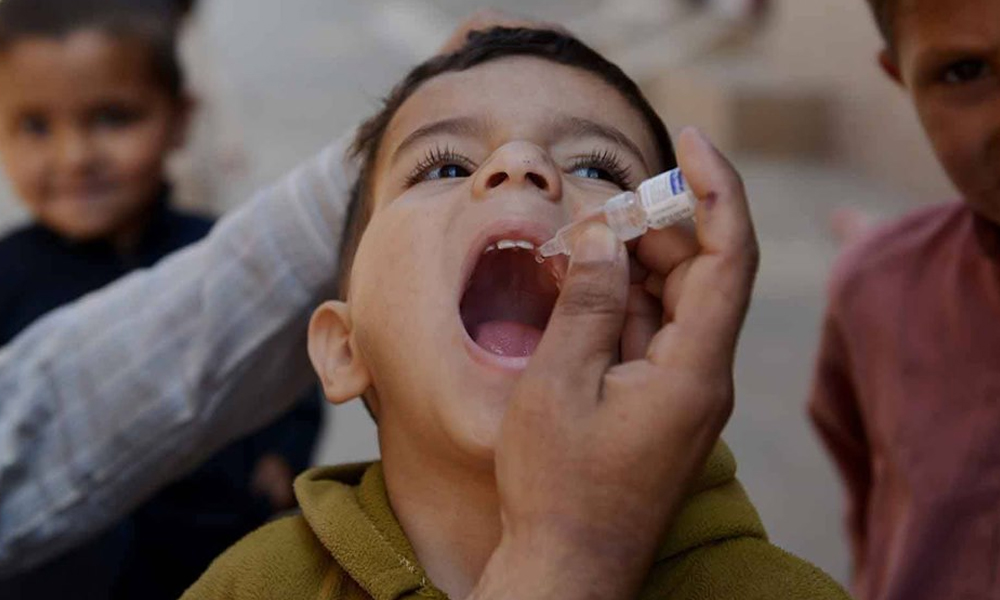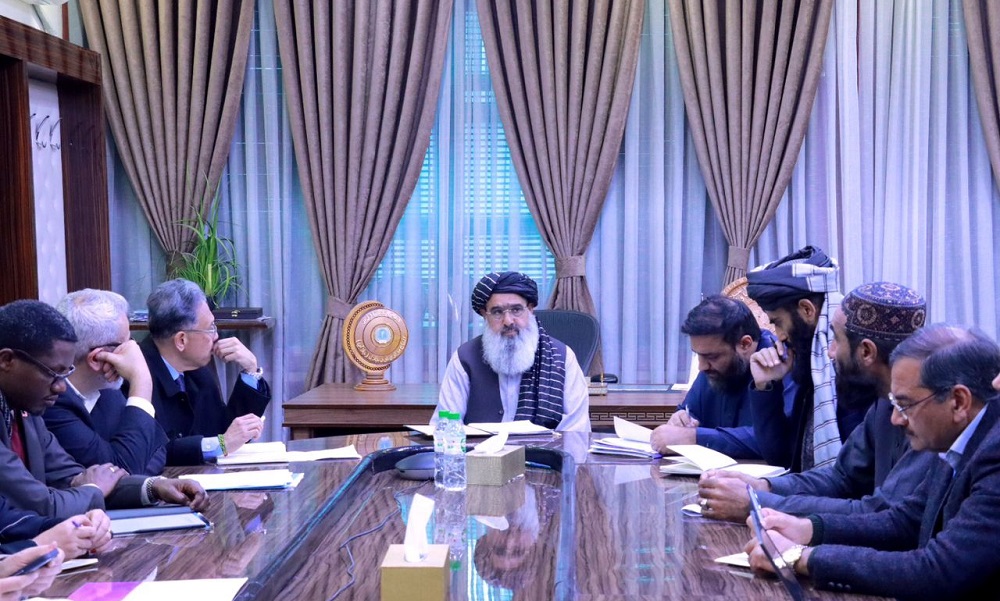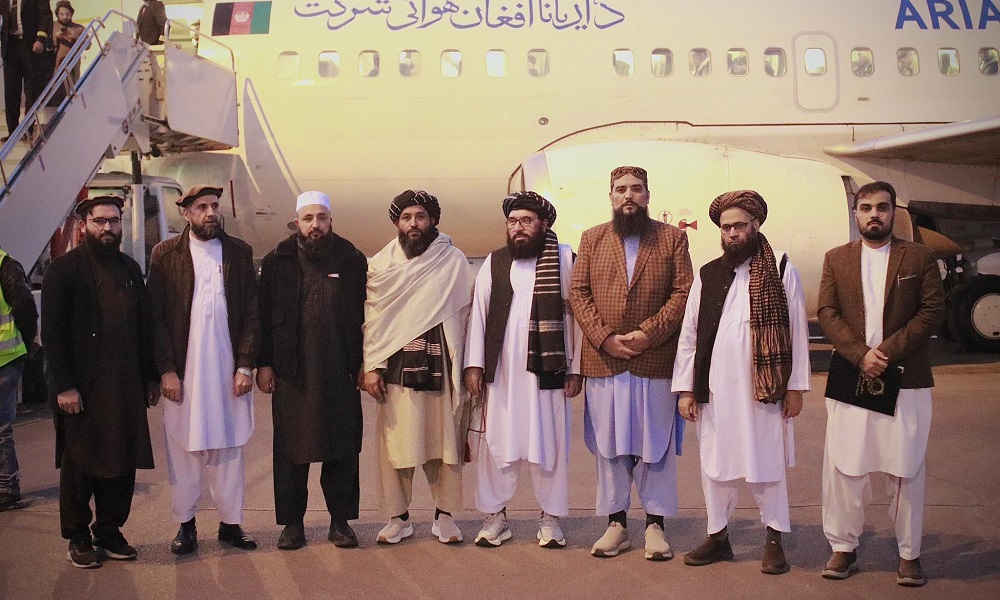Health
WHO rolls out measles vaccination campaign to fight ongoing outbreak

More than 1.2 million children aged 6 to 59 months are earmarked to be vaccinated during the current measles vaccination campaign in Afghanistan, the World Health Organization (WHO) said in a statement.
According to WHO, about 9,200 health workers, volunteers, supervisors, and monitors have been mobilized to cover 49 districts in 24 provinces in a week-long campaign that started on Saturday. The campaign will wrap up on Thursday.
WHO in Afghanistan is supporting the Afghan Ministry of Public Health and provincial health authorities in the management of the vaccination.
“This measles immunization campaign is part of the national response measure to stop the spread of the outbreak, save lives of young children and reduce the burden on health systems”, says Dr Luo Dapeng, WHO Representative in Afghanistan, who joined the campaign in Malek Mohammad Khan District Hospital in Wardak province.
“I appeal to every parent to bring your kids for vaccination and give them the best gift of being protected from life-threatening but preventable disease. I also appeal to everyone to protect the health workers; they are protecting your children and it is your duty to ensure their safety.”
Afghanistan has been experiencing a measles resurgence that started at the beginning of 2021. From January 2021 to 13 March 2022, there have been 48,366 cases and 250 deaths.
In 2022 alone, there have been over 18,000 cases and 142 children have died of measles in the country.
“The rise in measles cases in Afghanistan is especially concerning because of the extremely high levels of malnutrition. Malnutrition weakens immunity, making people more vulnerable to illness and death from diseases like measles – especially children,” said Dapeng.
Health
Health ministry holds meeting with envoys of international organizations in Kabul

Noor Jalal Jalali, Minister of Public Health of Afghanistan, held a meeting in Kabul with representatives of the World Health Organization, UNICEF, the World Bank, the Asian Development Bank, the European Union, the UK Foreign, Commonwealth and Development Office (FCDO), and other international organizations.
According to the ministry’s statement, representatives of these international organizations discussed the delivery of health and development services, improving the management of aid and resources in the health sector, integrating health facilities and aligning them with the new policy, providing health services in accordance with the Ministry of Public Health’s policy, strengthening the immunization and vaccination sector, delivering services based on priorities, and ensuring sustained coordination.
During the meeting, Jalali stressed the need for transparency and attention to the ministry’s priorities in order to enhance the effectiveness and impact of health services. He added that the delivery of health services must be carried out in line with the ministry’s policy and through better management of existing international assistance.
Referring to vaccination campaigns, he stated that the recent measles and polio vaccination campaign had been implemented very successfully, and emphasized that necessary preparations should be made for upcoming campaigns.
He also provided information regarding the review of the BPHS and EPHS health packages and the establishment of a standardized system through technical committees.
In this meeting, Edwin Ceniza, the WHO Representative for Afghanistan, reaffirmed the organization’s continued cooperation with the Ministry of Public Health and expressed appreciation to the ministry’s leadership for their tireless efforts to improve the health system.
Representatives of these organizations pledged to maintain effective and sustained coordination and to provide their services within the country in accordance with the policies and principles of the Ministry of Public Health.
Health
IEA health delegation travels to Turkey

Abdul Wali Haqqani, Deputy Minister for Health Services at the Ministry of Public Health of the Islamic Emirate of Afghanistan (IEA), has departed for Turkey on an official visit accompanied by a high-ranking delegation.
According to a statement released by the Health Ministry on Wednesday, the trip aims to acquire new health-sector expertise, assess Turkish medical and scientific institutions, meet with Turkish health and government officials, and strengthen bilateral cooperation.
During the visit, the delegation is scheduled to meet representatives from both public and private health sectors to support improvements in Afghanistan’s healthcare system and enhance coordination between the two countries, the statement added.
Health
Polio vaccination drive launches across 17 Afghan provinces
Officials say routine vaccination remains the most effective tool for eliminating polio and have urged families to fully cooperate with health teams during the campaign.

The Ministry of Public Health has announced the launch of a major anti-polio vaccination campaign, set to begin on Monday across 17 provinces of Afghanistan.
According to Sharafat Zaman, spokesperson for the ministry, the nationwide initiative will target 7.4 million children under the age of five, delivering vaccines door-to-door to prevent the spread of the poliovirus and safeguard children’s health.
Officials say routine vaccination remains the most effective tool for eliminating polio and have urged families to fully cooperate with health teams during the campaign.
This effort forms part of the government’s ongoing strategy to protect Afghanistan’s next generation from preventable diseases and strengthen public health across the country.
This comes after the World Health Organization (WHO) recently again classified the global spread of poliovirus as a Public Health Emergency of International Concern (PHEIC), warning that the disease remains endemic in only two countries — Afghanistan and Pakistan.
The decision followed the 43rd meeting of the Polio Emergency Committee under the International Health Regulations (IHR), which convened on 1 October 2025.
According to the Committee, Afghanistan reported four new wild poliovirus type 1 (WPV1) cases so far this year, compared to 24 in Pakistan.
The Afghan cases were detected in the country’s southern and eastern regions, where transmission remains intense despite ongoing vaccination efforts.
-

 Sport4 days ago
Sport4 days agoILT20: Desert Vipers edge Gulf Giants in historic super over thriller
-

 Latest News2 days ago
Latest News2 days agoMuttaqi: Afghanistan’s progress requires both religious and modern education
-

 Regional4 days ago
Regional4 days agoSix Pakistani soldiers killed in TTP attack in Kurram District
-

 Business4 days ago
Business4 days agoTrade bodies warn almost 11,000 Afghan transit containers stuck at Karachi port
-

 World4 days ago
World4 days agoPowerful 7.6 earthquake hits northern Japan, tsunami warnings issued
-

 Latest News3 days ago
Latest News3 days agoTrump calls Afghanistan a ‘hellhole’ country as US expands immigration restrictions
-

 Sport5 days ago
Sport5 days agoSorkh Poshan Khafi defeats Sarsabz Yashlar 4-0 in Afghanistan Champions League
-

 Sport3 days ago
Sport3 days agoCommanding wins for Arman FC and Sarsabz Yashlar in Afghanistan Champions League
























